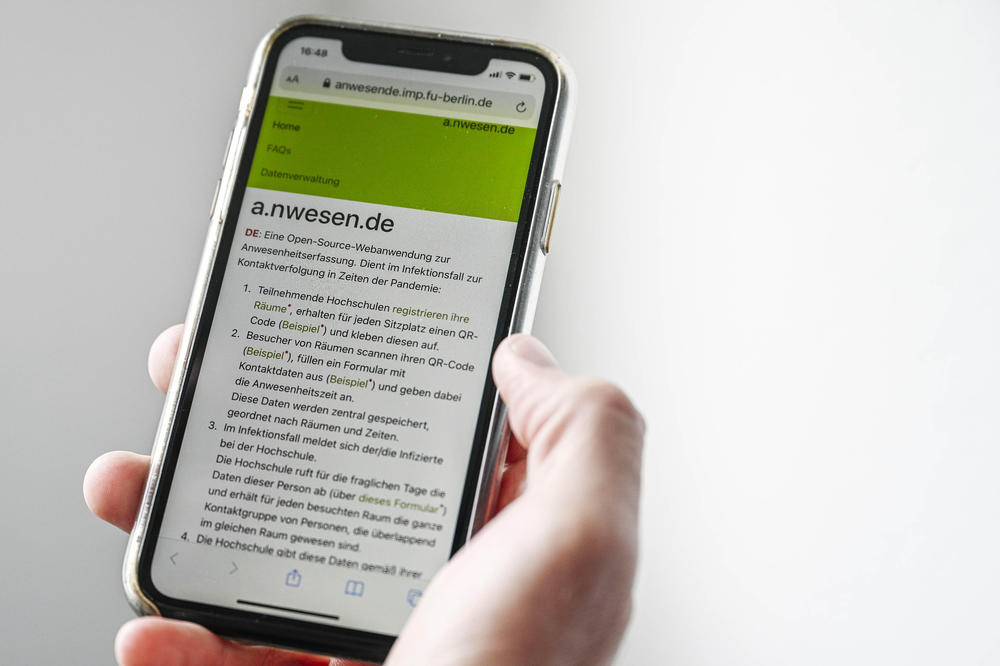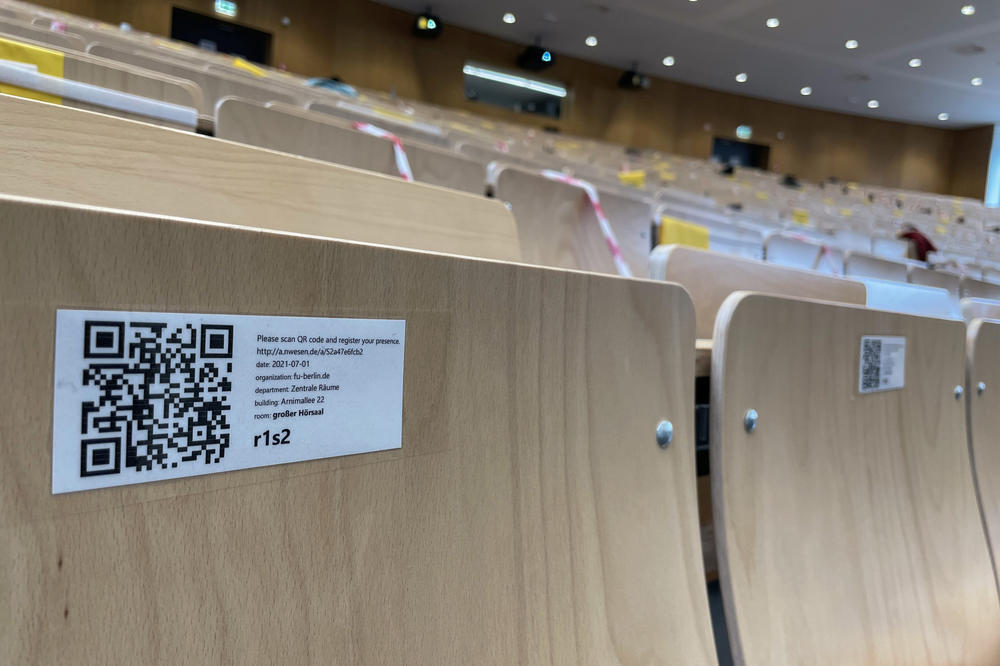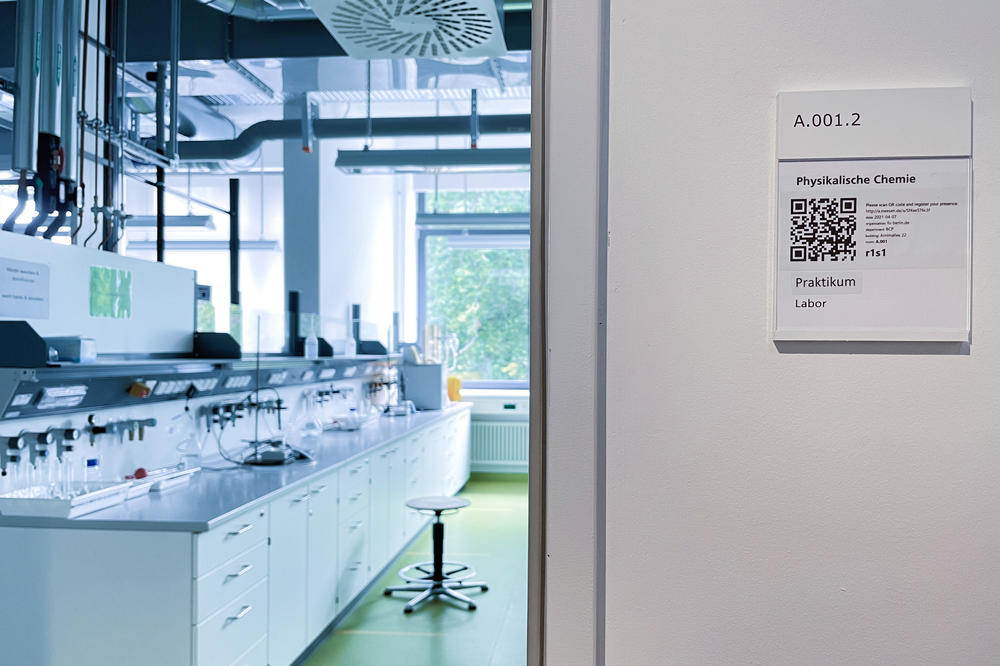A Safe Start to the Semester
Computer Science Professor Lutz Prechelt at Freie Universität Berlin Has Developed a Web App to Simplify Contact Tracing at the University
Oct 01, 2021
Thanks to a unique contact tracing system and the “3G Rule,” more students will be able to attend lectures in person this semester.
Image Credit: Bernd Wannenmacher
#yeswecampus – Freie Universität Berlin is getting ready for a semester with on-site operations back in place for the most part. However, university members will still need to observe safety and health measures during the 2021/2022 winter semester in order to limit the risk of Covid-19 infections. A new app developed by Freie Universität’s own professor of computer science, Lutz Prechelt, will help contribute to stopping the spread of the virus. The “a.nwesen.de” app (which literally means “present” – as opposed to “absent”) was developed especially for use at universities. It can quickly identify individuals who have had contact with an infected person and thus stop the chain of infection.
Here is how the web app works: Employees from the departments, central institutes, and libraries register their rooms, receive a QR code for each seat or station, and stick these on all the seats or tables. Students scan their QR code at their seat and then submit their contact details with the time spent at their seat via the web app.
If a course participant contracts Covid-19, they can notify their instructor or the department. A list of contacts who were in the vicinity of the infected attendee is created using the stored data. The university is not only able to send the list to the public health department as required by law, but can also notify the other contacts without delay.
The app uses QR codes assigned to specific seats and computes the distances between the people in the contact lists.
Image Credit: Marion Kuka
The App Can Be Used via Smartphone Browsers
Professor Prechelt explains why neither the German federal government’s Corona-Warn-App nor the popular Luca-App are suitable for this type of highly specific contact tracing: “In order to disrupt the chain of infection, the individuals who may be infected must be notified before they unknowingly transmit the virus to others. The Corona-Warn-App only sends notifications once a positive PCR test result has been registered.” However, the a.nwesen.de web app makes it possible to warn contacts even in the event of a suspected case. The early warning, sometimes one to two days earlier, can prove crucial in containing the spread of the virus.
Students would also have to install the Luca-App and Corona-Warn-App on their smartphones, which can be difficult for those with older cell phones or limited storage capacity. A web app in contrast can simply be accessed via the smartphone browser. This offers one significant advantage in particular: “a.nwesen.de uses QR codes for specific seats and computes the distances between contacts in the contact lists.”
Easy to Use
Professor Prechelt wanted the application to be as easy to use as possible and thus wanted to avoid programming a complex authorization system with user accounts. Anyone who needs to submit a query can send their request to the few authorized users on Professor Prechelt’s team and receive the contact lists by email.
He had to decline some of the suggestions from users in the departments, but he was able to factor in others. For example, instructors are now able to see how many people in the room have checked in digitally via the application and compare this with the number of people present. If there is a discrepancy between these two numbers, then students who have forgotten to sign in will be reminded to do so.
The laboratories belonging to the Department of Biology, Chemistry, Pharmacy have been using Professor Prechelt’s QR codes since April.
Image Credit: Marion Kuka
Keeping Tabs on Contact Tracing
Gesine Milde, secretary to the research working group, is responsible for distributing the stickers with the QR codes to lecture halls, seminar rooms, and workstations in the libraries. She receives spreadsheets with the details for the rooms and uses the app to create QR codes in PDF format. “The employees from the departments and the Engineering and Utilities Division cut out and stick these codes at the proper locations,” says Milde. Some colleagues started this process during the summer, but the most requests have come in over the last two weeks.
Thanks to this contact tracing system and the “3G Rule,” more students will be able to attend lectures in person this semester. “Because each seat or station has a code, we will know exactly who we have to notify if the person sitting there was in the vicinity of a suspected case,” says Professor Prechelt. If a confirmed or suspected case is reported, then a personalized standard notification is issued to the people at risk of having contracted the virus.
Laboratory Work as a Trial Run
The Department of Biology, Chemistry, Pharmacy has been using the app since April as practical laboratory work could not be conducted online. “We put a lot of work into ensuring that our students could still undertake the practical components of their degrees and graduate on time in spite of the pandemic,” says Thorsten Grospietsch, Desk Officer for Academic Studies and Teaching in the department.
Glass partitions, mandatory testing and masks, disinfection, provision of hand sanitizer, and more lab work sessions with fewer participants than usual in each group were among the main measures taken to ensure the safety of all those present. However, Grospietsch says that they also wanted to ensure accurate contact tracing in the event that a participant contracted the virus and potentially transmitted it to others. That’s why they decided to attach Prechelt’s QR codes to the work benches in the labs. The department is now in the process of installing stickers in the lecture halls and seminar rooms, and is looking forward to being able to offer more classes in person.
This article originally appeared in German on September 20, 2021, in campus.leben, the online magazine of Freie Universität Berlin.
Further Information
- You can access the a.nwesen.de server here: http://a.nwesen.de
- You can access the open-source software here: https://github.com/prechelt/anwesende/blob/master/README.md



